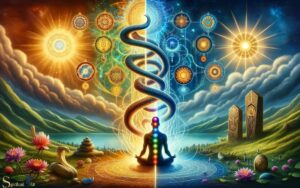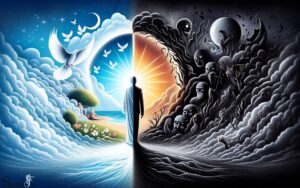Psychosis Vs Spiritual Awakening: Personal Growth!
Distinguishing between psychosis and spiritual awakening is essential for individuals experiencing profound personal changes.
Psychosis is a mental health condition characterized by a disconnection from reality, whereas a spiritual awakening is a shift in consciousness that can lead to enhanced personal insights and a deeper understanding of the universe.
Recognizing the signs and implications of each can lead to appropriate support and personal growth.
Psychosis typically involves a range of symptoms including hallucinations, delusions, disorganized thinking, and impeded daily functioning.
It is often associated with mental health disorders such as schizophrenia or bipolar disorder and usually requires medical intervention.
In contrast, a spiritual awakening is a transformative experience that may include a heightened sense of awareness, interconnectedness, and a reevaluation of one’s life purpose.
It is not considered a medical condition but rather a personal development phase that can be nurtured and explored.
Here are the some point of Psychosis and Spiritual Awakening:
Psychosis:
- Hallucinations (seeing or hearing things that aren’t there)
- Delusions (strong beliefs in things with no basis in reality)
- Disorganized thinking
- Difficulty in daily functioning
Spiritual Awakening:
- Enhanced awareness
- Feeling of unity with the universe
- Personal insights
- Life purpose reevaluation
It’s crucial to approach the topic of psychosis versus spiritual awakening with sensitivity, as both experiences can profoundly affect an individual’s life. By understanding their characteristics, one can better navigate these complex experiences and seek appropriate guidance and support.
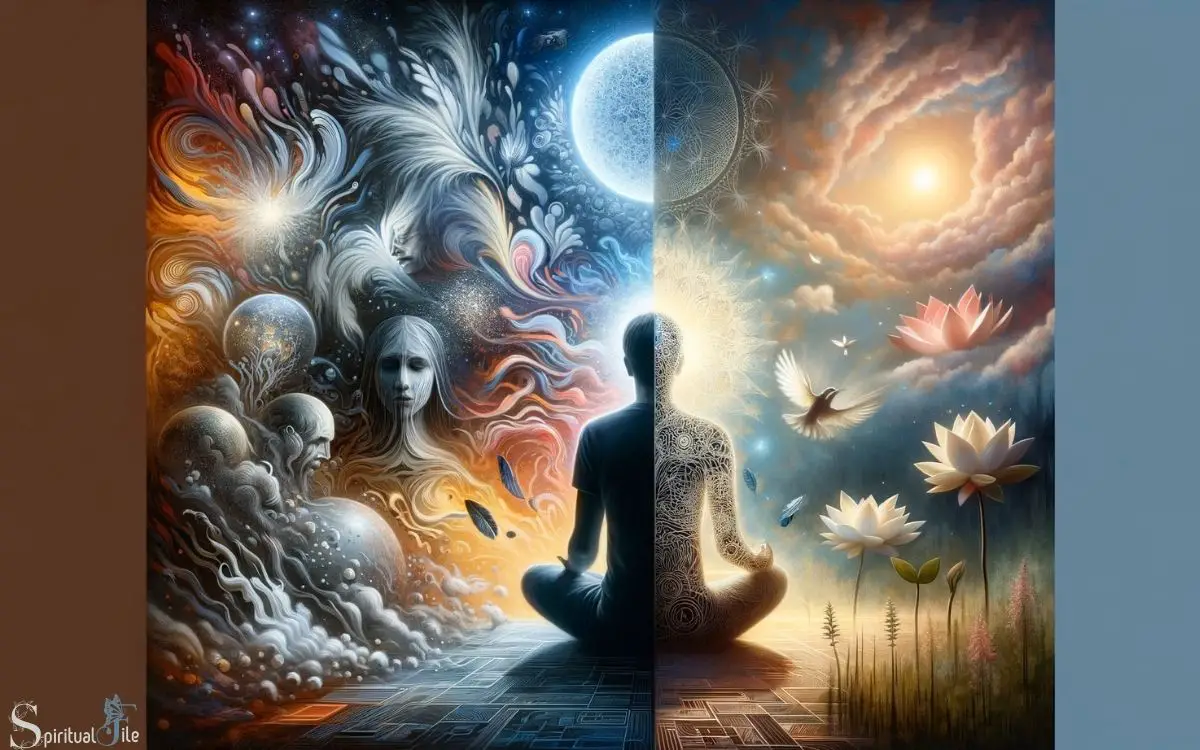
Key Takeaway
5 Aspects: Psychosis Vs Spiritual Awakening
| Aspect | Psychosis | Spiritual Awakening |
|---|---|---|
| Perception of reality | Distorted and erratic | Expanded and profound |
| Emotional state | Fear, confusion | Peace, clarity |
| Self-awareness | Decreased | Enhanced |
| Connection to others | Isolation | Unity |
| Purpose | Negative impact | Personal growth |
Understanding Psychosis

Understanding psychosis requires a comprehensive exploration of its symptoms, causes, and impact on individuals’ mental health.
Psychosis encompasses a range of symptoms, including hallucinations, delusions, disorganized thinking, and a lack of insight into one’s condition.
These symptoms can be profoundly distressing for the individual experiencing them and challenging for their loved ones to witness.
The causes of psychosis are multifaceted, involving a complex interplay of genetic, environmental, and neurobiological factors.
It can arise as a result of mental health disorders such as schizophrenia, bipolar disorder, or severe depression. Furthermore, substance abuse, extreme stress, and trauma can also trigger psychotic episodes.
The impact of psychosis on mental health is substantial, often leading to significant impairment in social, occupational, and daily functioning. Understanding psychosis is crucial for providing effective support and treatment to those affected.
Exploring Spiritual Awakening

Exploring spiritual awakening involves a profound shift in perception and consciousness, often marked by a heightened sense of interconnectedness and purpose.
Individuals undergoing spiritual awakening often experience a deep inner transformation, leading to a greater awareness of the self and the world around them.
This awakening may bring about a sense of unity with all living beings, a heightened sensitivity to the environment, and a profound connection to the universe or a higher power.
It is often accompanied by a desire for personal growth, self-discovery, and a search for meaning and fulfillment in life.
Understanding the characteristics and experiences associated with spiritual awakening is crucial in distinguishing it from psychosis and other mental health conditions.
Key Characteristics of Psychosis
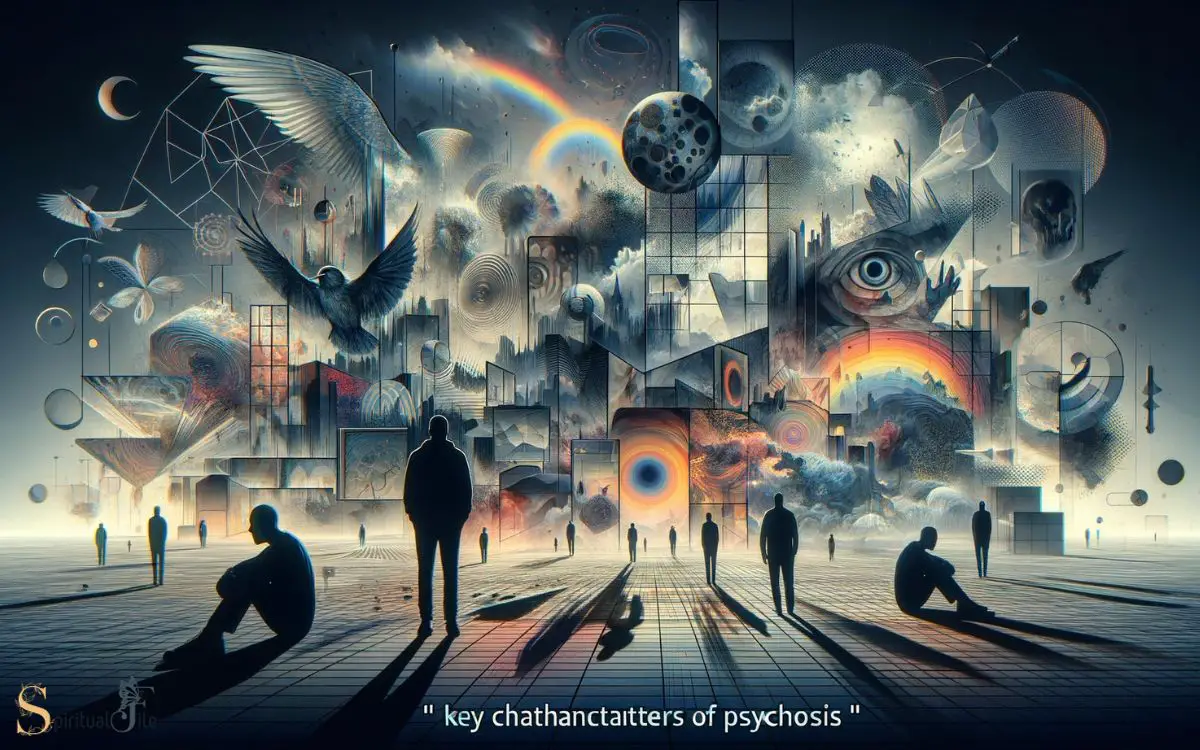
Key characteristics of psychosis encompass hallucinations, delusions, and disorganized thoughts and behavior. These symptoms can significantly impact an individual’s perception of reality and ability to function in daily life.
Understanding these key characteristics is essential in distinguishing between psychosis and spiritual awakening.
Hallucinations and Delusions
Hallucinations and delusions are significant indicators of psychosis, characterized by perceptual disturbances and false beliefs.
Hallucinations involve experiencing sensory perceptions in the absence of external stimuli, such as hearing voices or seeing things that are not there.
Delusions, on the other hand, are fixed beliefs that are not amenable to change in light of conflicting evidence. These false beliefs often center around paranoia, grandiosity, or persecution.
It’s important to note that individuals experiencing spiritual awakenings may also report sensory perceptions and hold unconventional beliefs. However, the key distinction lies in the level of distress and impairment these experiences cause.
In psychosis, hallucinations and delusions significantly disrupt daily functioning and can lead to severe distress, whereas in spiritual awakening, these experiences often bring about a sense of enlightenment and personal growth.
Disorganized Thoughts and Behavior
Disorganized thoughts and behavior are fundamental features of psychosis. This includes difficulties in coherent thinking, erratic speech, and impaired decision-making.
Individuals experiencing psychosis may struggle to organize their thoughts in a logical sequence, leading to fragmented and incoherent speech patterns.
Their behavior may appear unpredictable and disorganized, with sudden and inexplicable shifts in actions or responses. Decision-making becomes impaired, making it challenging for individuals to assess situations rationally and make sound judgments.
These manifestations of disorganized thoughts and behavior can significantly disrupt daily functioning and interpersonal relationships.
Understanding these key characteristics is crucial in distinguishing psychosis from spiritual awakening, as it allows for early recognition and appropriate intervention to support individuals experiencing psychosis.
It is essential to approach this topic with empathy and a desire to comprehend the complexities of these experiences.
Key Characteristics of Spiritual Awakening

As individuals undergo a spiritual awakening, they often experience a profound shift in perception and consciousness, which can be distinguished from psychosis through a deeper connection to universal truths.
Key characteristics of spiritual awakening include a heightened sense of interconnectedness with all living beings, increased empathy and compassion towards others, and enhanced intuition and a deep sense of inner peace and fulfillment.
These characteristics often lead individuals to seek a deeper understanding of the universe and their place within it. Unlike psychosis, where individuals may experience delusions and disconnected thoughts, spiritual awakening fosters a sense of harmony and clarity.
It is important to recognize these key characteristics when differentiating between spiritual awakening and psychosis, as they can have significant impacts on an individual’s beliefs and behaviors.
Differentiating Between the Two

The differentiation between psychosis and spiritual awakening can be discerned through an understanding of their distinct effects on an individual’s perception and consciousness.
| Psychosis | Spiritual Awakening |
|---|---|
| Involves distorted perception of reality | Enhanced perception of reality |
| Marked by delusions and hallucinations | Characterized by inner peace and clarity |
| Often accompanied by fear and confusion | Accompanied by a sense of connection and purpose |
| Leads to impaired functioning in daily life | Enhances well-being and personal growth |
| Typically requires medical intervention | Does not typically require medical intervention |
Understanding these differences is crucial in order to provide appropriate support and guidance to individuals experiencing either psychosis or spiritual awakening.
Navigating Support and Guidance
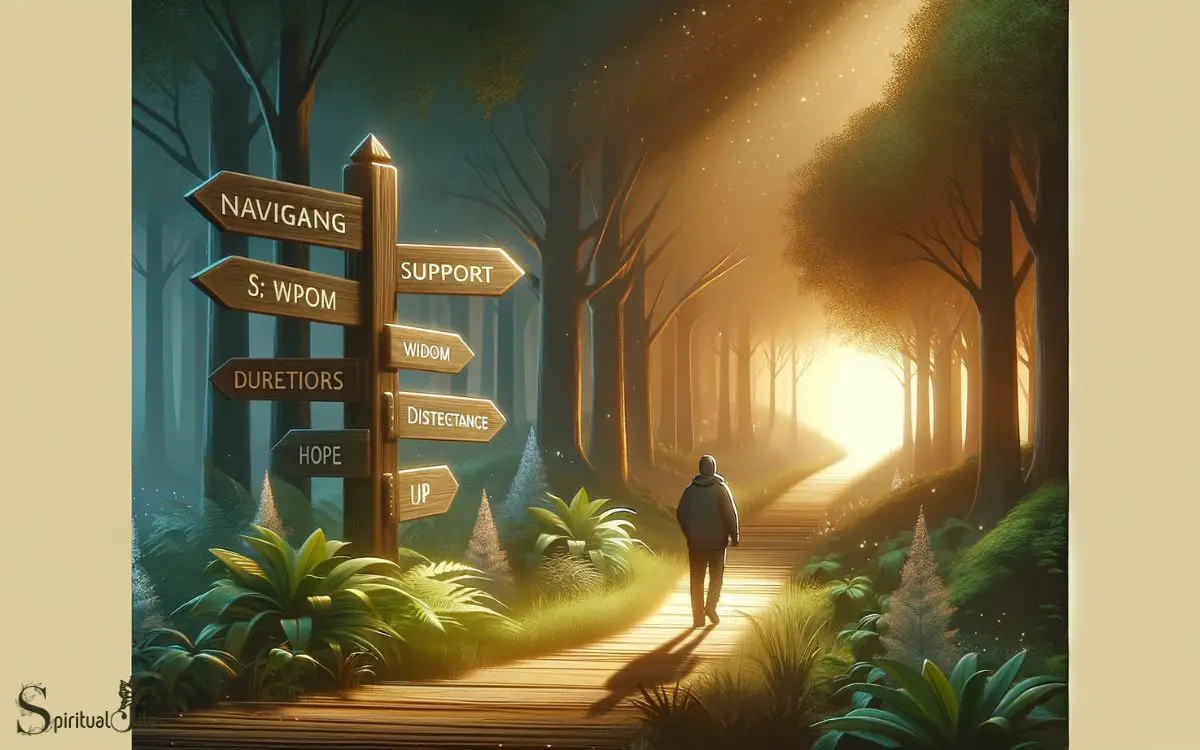
Professional support and guidance plays a crucial role in helping individuals navigate the complexities of psychosis and spiritual awakening.
When seeking support and guidance, it is important to consider the following:
- Seek out a qualified mental health professional who has experience in working with individuals experiencing spiritual crises.
- Engage in open and honest communication with your support system, including friends, family, and community members who can provide emotional support.
- Explore holistic approaches such as mindfulness practices, meditation, and yoga, which can complement traditional therapeutic interventions and support overall well-being.
Spiritual Emergency vs Psychosis
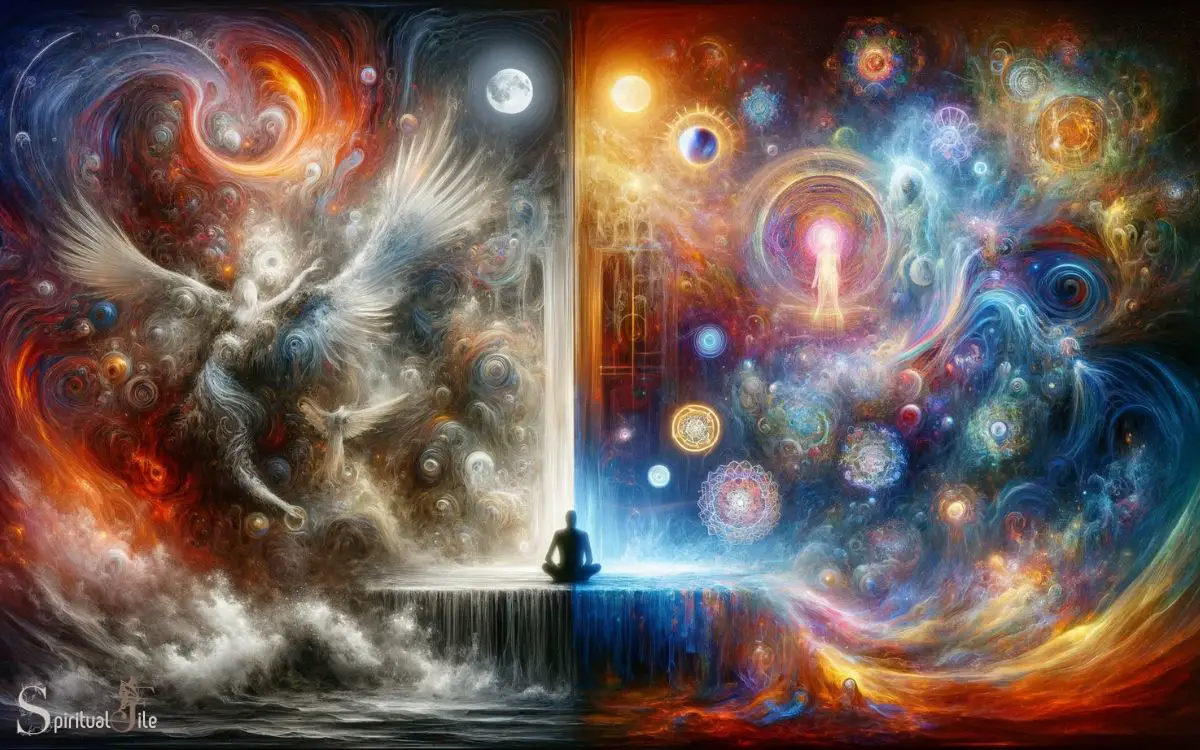
Spiritual emergency and psychosis are two different concepts that can sometimes be confused because they share some similar symptoms and experiences.
However, they have distinct differences:
- Spiritual Emergency:
- Spiritual emergency refers to a transformative and often challenging experience that individuals may go through as they explore their spirituality or engage in intense spiritual practices.
- It is typically seen as a temporary and potentially positive process, where individuals may undergo significant personal and spiritual growth.
- Characteristics of a spiritual emergency may include altered states of consciousness, mystical experiences, intense emotions, and a sense of connection to something greater than oneself.
- People going through a spiritual emergency may experience confusion, disorientation, and a sense of crisis, but these symptoms are often viewed as part of the transformative journey rather than signs of mental illness.
- Spiritual emergency is often supported by spiritual or transpersonal counselors and may involve practices like meditation, yoga, or breathwork.
- Psychosis:
- Psychosis is a mental health condition characterized by a loss of contact with reality. It can involve symptoms such as hallucinations (seeing or hearing things that aren’t there), delusions (false beliefs), disorganized thinking, and impaired insight into one’s condition.
- Psychosis is usually seen as a mental disorder and can be caused by various factors, including schizophrenia, bipolar disorder, severe depression, substance abuse, or medical conditions.
- It often requires medical intervention, such as medication and psychotherapy, to manage and treat the underlying condition causing the psychotic symptoms.
- Psychosis can be disruptive to a person’s life and may lead to impaired functioning and distress.
Is it possible for a spiritual awakening to be mistaken for symptoms of psychosis or bipolar disorder?
Many individuals who experience a spiritual awakening may initially mistake the signs for symptoms of bipolar disorder or psychosis. This confusion can be due to the intense emotions and altered perception commonly associated with both spiritual awakening and bipolar disorder. It is important to seek professional guidance to differentiate between the two experiences.
Frequently Asked Questions
How Can Someone Differentiate Between a Spiritual Awakening and a Psychotic Episode if They Experience Both at the Same Time?
Differentiating between a spiritual awakening and a psychotic episode when experiencing both simultaneously requires thorough evaluation by mental health professionals.
Symptoms, duration, and impact on daily functioning are crucial factors in distinguishing between the two experiences.
Are There Any Specific Spiritual Practices or Beliefs That Could Potentially Trigger a Psychotic Episode in Someone Predisposed to Mental Illness?
Certain spiritual practices or beliefs may potentially trigger a psychotic episode in individuals predisposed to mental illness.
Factors such as intense meditation, sleep deprivation, or extreme isolation can exacerbate underlying mental health conditions. Understanding these triggers is crucial for mental health support.
Can Someone Experience a Spiritual Awakening as a Result of Recovering From Psychosis, or Vice Versa?
It is possible for individuals to experience a spiritual awakening as they recover from psychosis, and vice versa.
This intersection of experiences can be complex and may require personalized support from mental health and spiritual professionals.
What Role Does Cultural or Religious Background Play in How Psychosis and Spiritual Awakening Are Perceived and Treated?
The role of cultural or religious background in the perception and treatment of psychosis and spiritual awakening is significant.
Beliefs, values, and practices impact how individuals and communities interpret and address these experiences, influencing clinical and social responses.
How Can Loved Ones and Support Networks Best Navigate and Understand the Overlap Between Psychosis and Spiritual Awakening in Someone Experiencing Both?
When supporting an individual experiencing both psychosis and spiritual awakening, loved ones and support networks can navigate the overlap by seeking professional guidance.
Pomoting open communication, and fostering a non-judgmental environment to understand their experiences.
Conclusion
It is clear that psychosis and spiritual awakening share some common characteristics, such as altered perceptions and intense experiences.
However, it is important to differentiate between the two in order to provide appropriate support and guidance to individuals experiencing these phenomena.
By understanding the key differences and seeking professional help, we can better navigate the complexities of these experiences and offer compassion and understanding to those going through them.

